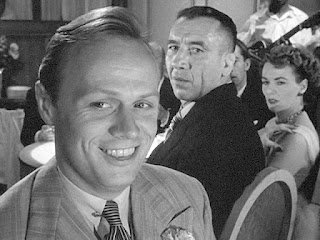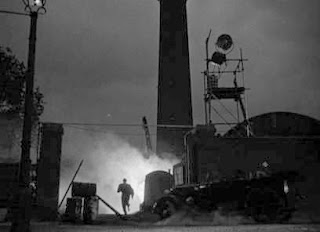Directed by Jules Dassin; produced by Samuel G Engel
Harry Fabian (Richard Widmark) is a small-time hustler with giant dreams. He scrapes by as a night-club tout but, to the disappointment of his girlfriend, Mary (Gene Tierney), always has a scheme brewing to get rich quick. His latest involves controlling the wrestling game in London, though his plan has a few flaws. One is a lack of cash, for which he scams his boss (Francis L Sullivan); another is the gangster (Herbert Lom) who already runs the wrestling game. But Harry Fabian doesn’t worry about problems like these - even though he should.
Not quite film noir, not quite crime-drama, Night and the City is a superb film, no matter its genre. Unlike Harry’s plans, it has few flaws, though its centre-piece is Widmark and his immaculate performance. No one mis-steps here, the closest to a weakness being the casting of Tierney. She doesn’t do a bad job; there just isn’t much for her to do. Her character is superfluous; indeed, in the 1993 re-make of Night and the City, Mary is excluded all together.
Widmark made his debut in 1947’s Kiss of Death, playing the psychopathic Tommy Udo. A lesser actor would have been typecast, and indeed Widmark had a bit of trouble expanding his roles for a while afterward. But Harry Fabian is quite a different kind of villain. He doesn’t think of himself as particularly bad. But he cheats, lies, steals and betrays to get what he wants.
Despite his self-proclaimed ‘brains’, Harry is not a smart man. In fact, almost everyone in the movie is smarter. Widmark’s Harry is a manic child, swinging from elation to anger in an instant, depending on whether his latest idea is being supported or thwarted. The breathless, fast-paced, ‘gotta-have-it-now’ performance is the prefect portrayal of a loser who is never satisfied.
There are reviews of Night and the City that describe every character as loathsome or unredeemable, but that isn’t exactly true. There are those who have decent qualities, though one must look hard. Witness Lom’s pride and love as he watches his father in one particular scene, and one can understand Sullivan’s despair, as he pines for the affection of his wife in a marriage of convenience. But the world in which Harry Fabian moves is nonetheless dirty and ruthless, filled with congenial back-stabbers.
The plot is a good one. It’s not spoiling the story to write that there is little suspense in whether Harry’s scheme will succeed. What is fascinating to watch is how his superficial and momentary victories are constructed on the most brittle of thin ice. The suspense is in trying to determine how Harry will fail, how big he will fail and who he will take with him when he fails.
The direction is excellent. It moves into film noir in many instances, aided by Max Greene’s cinematography, but is always spot-on, whether in claustrophobic close-ups of Harry’s desperate face, or in wide shots of a fugitive scrambling over the still prominent ruins of the Blitz. It almost creates sympathy for Harry, even while he does nothing to earn it.
An example of how different elements in Night and the City (in this case, writing and directing) combine to create a masterpiece is the lengthy, tense scene involving a wrestling bout between an aged champion (Stanislaus Zbyszko) and a younger performer (Mike Mazurki). The interesting thing about it, aside from how involving it is, is that, unlike many games or sports matches in movies, it doesn’t really matter who wins; it will propel the story, in one direction or another, regardless. The match is integral and important to the plot.
Night and the City is the result of everyone involved using all their skills, a movie that is compelling, involving and entertaining.









It wasn't what I'd call a feel-good movie, but it was very well done. (There apparently was a British version that had a slightly cheerier ending, but I have no idea how they could have pulled that off.)
ReplyDeleteYes, watching Fabian’s disastrous adventures is like observing an an automobile crash in slow-motion. There’s no way to avoid the conclusion, yet the process is fascinating. It’s the sort of movie that would not have appealed to me when I was younger, but now I am open to films that have a wider display of the human condition. It would have been hard to find another actor capable of pulling it off.
DeleteAll I could think of, as I read your description of Fabian, was how much this character is like the loser ex-boyfriend of my daughter. He was/is always trying to find a quick way to make a buck and usually failing miserably.
ReplyDeleteWhile the movie sounds interesting, I'll pass because I wouldn't be able to watch it without thinking of the loser. :)
It was a very realistic, well-written character. Unfortunately, there are too many people who think that luxury and ease are just a short and simple scam away.
Delete"Unfortunately, there are too many people who think that luxury and ease are just a short and simple scam away."
DeleteThat reminds me of what Josephine Tey said in "The Daughter of Time": Everyone can reason from A to B. Most adults can reason from A to B to C. But criminals can't.
I am stil lof two minds about seeing it. I have my set in stone I suppose, methods of dealing with hardship and bad "luck". (I do not believe in "luck", but I thought I would throw that in as many people seem to believe in it). I am probably rather a linear thinker. That phrase seems to mean several things to several peope. I will work a situation as though it was a jig saw puzzle. But I am not slow to reason or come to conclusons or action.
ReplyDelete.